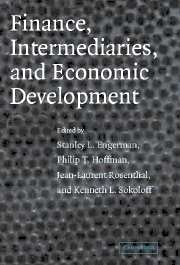Book contents
- Frontmatter
- Contents
- List of Contributors
- Preface
- Introduction
- I FINANCIAL INTERMEDIARIES IN EUROPE
- II FINANCIAL INTERMEDIARIES IN THE AMERICAS
- 4 The Mortgage Market in Upper Canada: Window on a Pioneer Economy
- 5 Integration of U.S. Capital Markets: Southern Stock Markets and the Case of New Orleans, 1871–1913
- 6 The Transition from Building and Loan to Savings and Loan, 1890–1940
- III OTHER FORMS OF INTERMEDIATION
- Afterword: About Lance Davis
- Index
- References
5 - Integration of U.S. Capital Markets: Southern Stock Markets and the Case of New Orleans, 1871–1913
Published online by Cambridge University Press: 24 July 2009
- Frontmatter
- Contents
- List of Contributors
- Preface
- Introduction
- I FINANCIAL INTERMEDIARIES IN EUROPE
- II FINANCIAL INTERMEDIARIES IN THE AMERICAS
- 4 The Mortgage Market in Upper Canada: Window on a Pioneer Economy
- 5 Integration of U.S. Capital Markets: Southern Stock Markets and the Case of New Orleans, 1871–1913
- 6 The Transition from Building and Loan to Savings and Loan, 1890–1940
- III OTHER FORMS OF INTERMEDIATION
- Afterword: About Lance Davis
- Index
- References
Summary
Introduction
As the twenty-first century begins, capital flows across regional and national boundaries in search of the best return available, commensurate with the risks involved. It is a new era of financial globalization. As capital flows into less developed regions and countries, emerging markets arise and development occurs. When capital flows out, however, financial crises erupt and development is stopped in its tracks and sometimes reversed. Capital market integration is a two-edged sword.
Among economic historians, no one has done more than Lance Davis to demonstrate the importance of capital markets and capital mobility for economic progress. This has been a grand theme of his five decades of scholarly work. Where capital markets are more innovative, efficient, and integrated, more rapid economic growth should result. Conversely, growth would likely be less rapid than it might have been if capital markets suffered from persistent “imperfections” as evidenced by lasting regional and national differentials, sometimes wide, in interest rates on loans and in returns on other financial assets. These are simple predictions of economic theory that guided Davis's work. The important lessons he taught others who followed in his footsteps had to do with data and their interpretation. He showed by example that there were available in historical records abundant datasets to be assembled for examining the predictions of theory. In addition, Davis demonstrated how to use such datasets to frame and address historical questions such as why some places had more efficient and integrated capital markets than others, what differences resulted, and how capital markets themselves changed – for better or for worse – over time.
- Type
- Chapter
- Information
- Finance, Intermediaries, and Economic Development , pp. 132 - 156Publisher: Cambridge University PressPrint publication year: 2003



